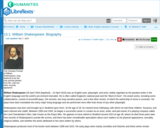
William Shakespeare biography
- Subject:
- History
- Language, Philosophy, and Culture
- Literature
- Material Type:
- Reading
- Date Added:
- 02/23/2022

William Shakespeare biography
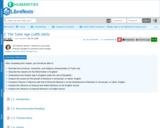
Brief history of the Tudor Age
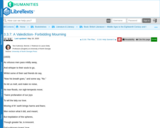
John Donne
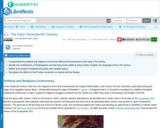
Description of the early seventeenth century as it pertains to British Literature.
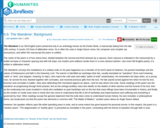
Background information about "The Wanderer"

A list of accessibility resources shared with the OER Essentials PD class at McLennan Community College.
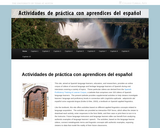
Actividades de práctica con aprendices del español is an online corpus of videos of second language and heritage language learners of Spanish during oral interviews and provides supplemental activities to help viewers investigate learners’ language and proficiency levels.
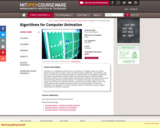
In-depth study of an active research topic in computer graphics. Topics change each term. Readings from the literature, student presentations, short assignments, and a programming project. Animation is a compelling and effective form of expression; it engages viewers and makes difficult concepts easier to grasp. Today's animation industry creates films, special effects, and games with stunning visual detail and quality. This graduate class will investigate the algorithms that make these animations possible: keyframing, inverse kinematics, physical simulation, optimization, optimal control, motion capture, and data-driven methods. Our study will also reveal the shortcomings of these sophisticated tools. The students will propose improvements and explore new methods for computer animation in semester-long research projects. The course should appeal to both students with general interest in computer graphics and students interested in new applications of machine learning, robotics, biomechanics, physics, applied mathematics and scientific computing.
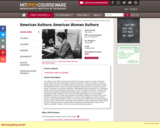
Examines in detail the works of several American authors. Through close readings of poetry, novels, or plays, subject addresses such issues as literary influence, cultural diversity, and the writer's career. Topic: American Women Authors. This subject, crosslisted in Literature and Women's Studies, examines a range of American women authors from the seventeenth century to the present. It aims to introduce a number of literary genres and styles- the captivity narrative, slave novel, sensational, sentimental, realistic, and postmodern fiction- and also to address significant historical events in American women's history: Puritanism, the American Revolution, industrialization and urbanization in the nineteenth century, the Harlem Renaissance, World War II, the 60s civil rights movements. A primary focus will be themes studied and understood through the lens of gender: war, violence, and sexual exploitation (Keller, Rowlandson, Rowson); the relationship between women and religion (Rowlandson, Rowson, Stowe); labor, poverty, and working conditions for women (Fern, Davis, Wharton); captivity and slavery (Rowlandson, Jacobs); class struggle (Fern, Davis, Wharton, Larsen); race and identity (Keller, Jacobs, Larsen, Morrison); feminist revisions of history (Stowe, Morrison, Keller); and the myth of the fallen woman (take your pick). Essays and inclass reports will focus more particularly on specific writers and themes and will stress the skills of close reading, annotation, research, and uses of multimedia where appropriate. A classroom electronic archive has been developed for this course and will be available as a resource for images and other media materials.
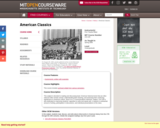
An examination of "classic" documents in American history from the seventeenth through the twentieth centuries, including writings by authors such as John Winthrop, Thomas Jefferson, and James Madison; Frederick Douglass, William Lloyd Garrison, and Abraham Lincoln; Horatio Alger, Jacob Riis and Thorstein Veblen; Franklin D. Roosevelt, Betty Friedan, Bob Dylan, and Martin Luther King, Jr. Music, taped speeches, television programs, motion pictures, and/or other visual materials may also be included. Class meetings consist primarily of discussions and there is one required museum trip.
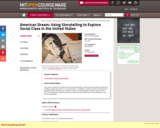
This course explores the experiences and understandings of class among Americans positioned at different points along the U.S. social spectrum. It considers a variety of classic frameworks for analyzing social class and uses memoirs, novels, and ethnographies to gain a sense of how class is experienced in daily life and how it intersects with other forms of social difference such as race and gender.
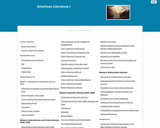
This course is a survey of American Literature from 1650 through 1820. It covers Early American and Puritan Literature, Enlightenment Literature, and Romantic Literature. It teaches in the context of American History and introduces the student to literary criticism and research.
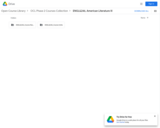
In this class we will practice skills in reading, analyzing, and writing about fiction, poetry and drama from a select sampling of 20th Century American Literature. Through class discussion, close reading, and extensive writing practice, this course seeks to develop critical and analytical skills, preparing students for more advanced academic work.
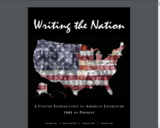
This books contains readings and questions for 1865 to the Present.
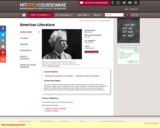
This course studies the national literature of the United States since the early 19th century. It considers a range of texts - including, novels, essays, and poetry - and their efforts to define the notion of American identity. Readings usually include works by such authors as Nathaniel Hawthorne, Henry David Thoreau, Frederick Douglass, Emily Dickinson, and Toni Morrison.
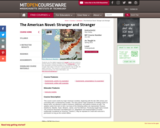
This course covers works by major American novelists, beginning with the late 18th century and concluding with a contemporary novelist. The class places major emphasis on reading novels as literary texts, but attention is paid to historical, intellectual, and political contexts as well. The syllabus varies from term to term, but many of the following writers are represented: Rowson, Hawthorne, Melville, Twain, Wharton, James, and Toni Morrison. Previously taught topics include The American Revolution and Makeovers (i.e. adaptations and reinterpretation of novels traditionally considered as American "Classics"). May be repeated for credit with instructor's permission so long as the content differs.
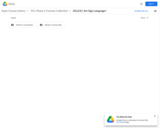
ASL I is an introduction to the naturally existing language widely used by Deaf people in North America. Since ASL is a visual-gestural language, students will need to develop unique communication skills. These consist of using the hands, body, face, eyes and space. In order to achieve progress in this class, it is important to become comfortable communicating with your whole body and listening with your eyes.
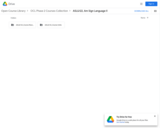
ASL II is a sequential course following ASL I, which continues to build knowledge of the naturally existing language widely used by Deaf people in North America. Since ASL is a visual-gestural language, students will need to continue to develop unique communication skills. These consist of using the hands, body, face, eyes and space. In order to achieve progress in this class, it is important to become comfortable communicating with your whole body and listening with your eyes.
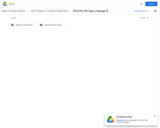
ASL III is the third quarter of the first year study of American Sign Language (ASL) and the people who use it. ASL III will enhance the use of ASL grammar and consist of concentrated efforts to develop the studentęs expressive and receptive skills. The course will continue to provide insights into Deaf Cultural values, attitudes and the Deaf community. Now learning more abstract concepts of the language, ASL III students will be able to: narrate events that occurred in the past, ask for solutions to everyday problems, tell about life events, and describe objects. Students will also be able to: demonstrate intermediate finger spelling competency, generate complex ASL structures with intermediate vocabulary knowledge, execute a wide variety of grammatical principles, including classifiers and inflections, adapt to different sign language registers, dialects and accents, and create opportunities to interact with members of the Deaf community.
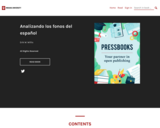
Este es un libro que pretende presentar de manera muy básica los sonidos del español con audios y ejercicios para practiar.